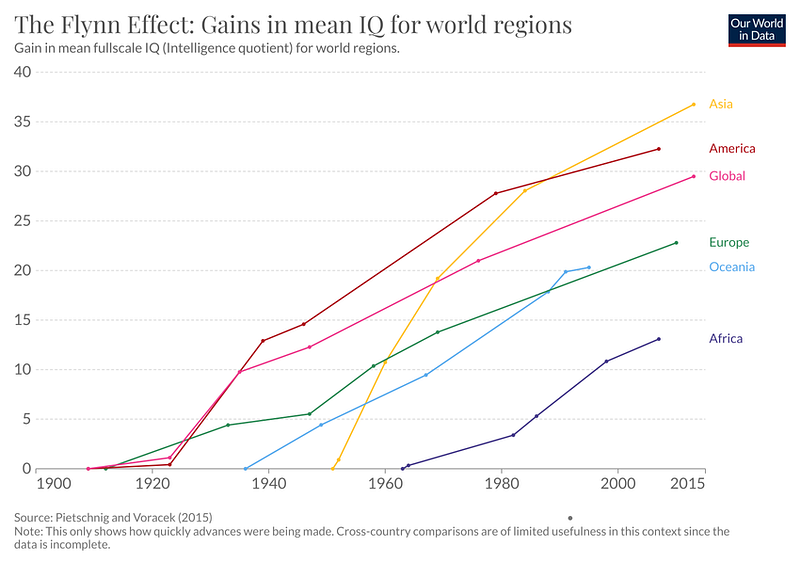Are We Really Becoming Less Intelligent? Insights on Modern IQ
Written on
Chapter 1: Understanding Intelligence Trends
Are we witnessing a decline in intelligence, or is there a more complex issue at play?

Recent research has revealed a worrying trend: three components of emotional intelligence (EI) have significantly dropped over the past two decades. Although the overall emotional intelligence score has remained stable, specific areas such as "well-being," "self-control," and "emotionality" have seen considerable declines. Researchers link these changes to increased reliance on technology, though they stop short of asserting a direct causal relationship. This isn't an isolated finding; another study indicated that individuals born after 1975 have experienced a decline in average IQ. So, are we truly becoming less intelligent?
The Flynn Effect: A Historical Perspective
For decades, we have celebrated the Flynn Effect, which highlights an upward trend in IQ scores worldwide since the early 20th century. This phenomenon indicates that when individuals take modern IQ tests, their scores are adjusted to ensure an average of 100. Conversely, those who attempt older tests often score significantly higher. For instance, research showed that British children improved their IQ scores by over 14 points from 1942 to 2008. Notably, this study also pointed out that improvements began to plateau post-1979, with some data suggesting reversals, paralleling the trends we see today.
Various explanations have been proposed for the Flynn Effect, such as better nutrition, vaccinations, familiarity with test formats, and advancements in education. These findings suggest that humanity is capable of improving in specific tasks. Yet, it raises the question: were our ancestors truly less intelligent? Some argue that our forebears displayed greater intelligence, as evidenced by their ability to create monumental structures like the Pyramids and the Great Wall using rudimentary tools and mathematical principles. So, where does this leave us? Are contemporary individuals smarter or not?
What Constitutes Intelligence?

IQ tests typically measure a limited scope of intelligence and often require a certain level of motivation to perform well. Research indicates that motivation can add approximately 10 points to an IQ score. Thus, what truly defines intelligence?
This question often diverts us from the core issue: how do we define intelligence itself? A broad definition might be the capacity to adapt to and solve new challenges. Tests for both emotional and intellectual intelligence focus on particular types of knowledge and problem-solving skills. IQ tests, for example, necessitate familiarity with specific concepts, particularly in mathematics. If you’re not acquainted with the Fibonacci sequence, you might miss a question, highlighting the challenge of assessing innate learning capabilities across different eras. After all, no one in the 1500s needed to master smartphone technology.
Chapter 2: The Impact of Technology on Intelligence
In the first video, "Why Are We Getting Dumber?", various theories and research findings are discussed regarding the perceived decline in intelligence across generations.
The second video, "Are Humans Getting Dumber?", further explores the implications of modern technology on human cognitive abilities and emotional skills.
Social Evolution and Modern Skills
The more plausible explanation for observed trends is the shift in the skill sets required for contemporary success. Nowadays, few people perform long division, as calculators are readily available. Skills such as recognizing social dynamics, detecting dishonesty, and working collaboratively have become essential. Although tests for emotional intelligence have been designed to assess these capabilities, some measures indicate a decline. Notably, however, the fundamental trait of emotional intelligence remains unchanged, as does sociability.
One constant is that humans adapt to their environments—both physical and social. They learn what skills are most advantageous for success. As societal environments evolve, they increasingly shape human development.
It appears that while social factors are changing rapidly, our assessment tools are lagging behind. The new generation isn't less intelligent; they simply face different challenges than those in the 1970s. Today's youth are intelligent, just in distinct ways—they may even offer valuable insights to the rest of us.